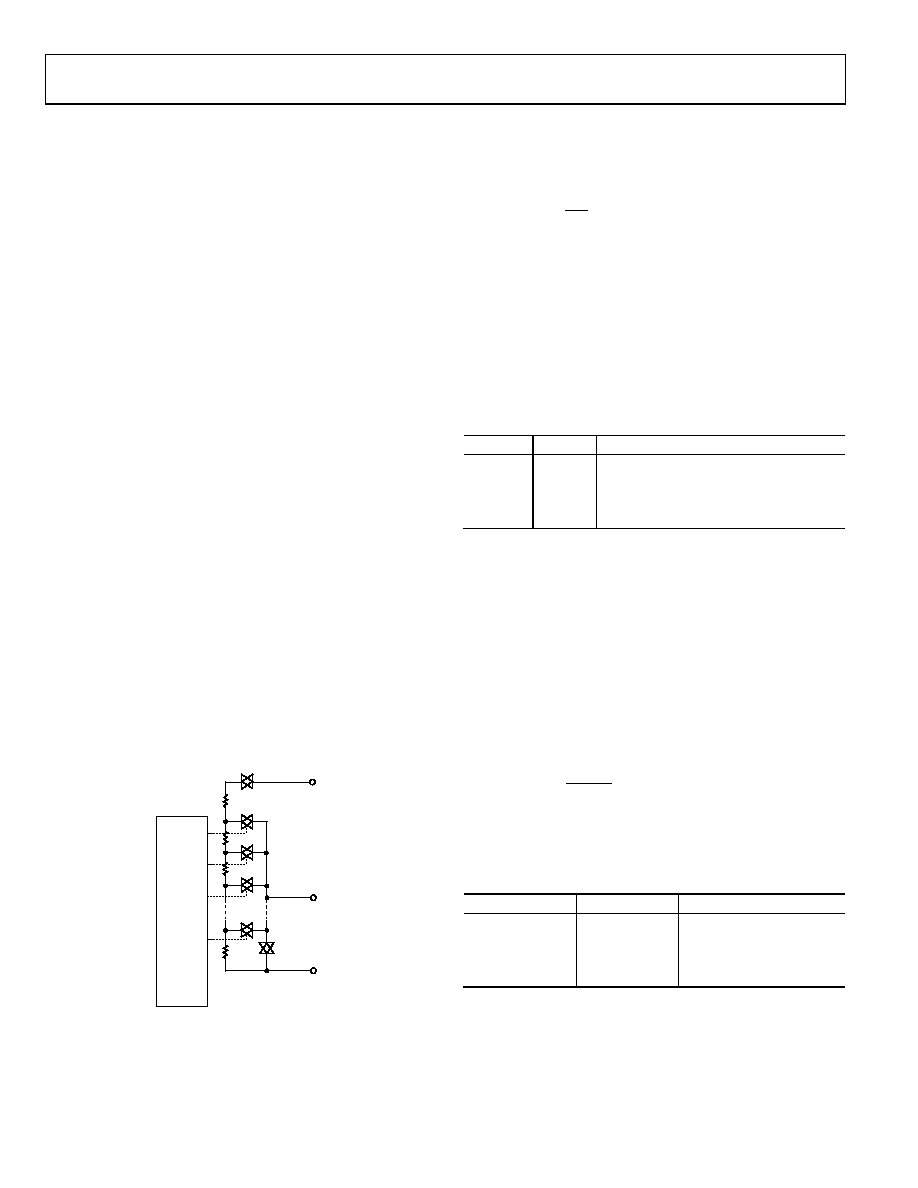- 您現(xiàn)在的位置:買賣IC網(wǎng) > PDF目錄9372 > AD5160BRJZ10-R2 (Analog Devices Inc)IC POT DGTL SPI 256POS SOT23-8 PDF資料下載
參數(shù)資料
| 型號: | AD5160BRJZ10-R2 |
| 廠商: | Analog Devices Inc |
| 文件頁數(shù): | 6/16頁 |
| 文件大小: | 0K |
| 描述: | IC POT DGTL SPI 256POS SOT23-8 |
| 標(biāo)準(zhǔn)包裝: | 1 |
| 接片: | 256 |
| 電阻(歐姆): | 10k |
| 電路數(shù): | 1 |
| 溫度系數(shù): | 標(biāo)準(zhǔn)值 45 ppm/°C |
| 存儲器類型: | 易失 |
| 接口: | 3 線串行(芯片選擇) |
| 電源電壓: | 2.7 V ~ 5.5 V |
| 工作溫度: | -40°C ~ 125°C |
| 安裝類型: | 表面貼裝 |
| 封裝/外殼: | SOT-23-8 |
| 供應(yīng)商設(shè)備封裝: | SOT-23-8 |
| 包裝: | 標(biāo)準(zhǔn)包裝 |
| 其它名稱: | AD5160BRJZ10-R2DKR |

AD5160
Rev. B | Page 14 of 1
6
THEORY OF OPERATION
The AD5160 is a 256-position digitally controlled variable
resistor (VR) device.
An internal power-on preset places the wiper at midscale
during power-on, which simplifies the fault condition recovery
at power-up.
PROGRAMMING THE VARIABLE RESISTOR
Rheostat Operation
The nominal resistance of the RDAC between Terminal A and
Terminal B is available in 5 kΩ, 10 kΩ, 50 kΩ, and 100 kΩ. The
final two or three digits of the model number as listed in the
Ordering Guide section determine the nominal resistance value,
for example, in model AD5160BRJZ10, the 10 represents 10 kΩ;
and in AD5160BRJZ50, the 50 represents 50 kΩ.
The nominal resistance (RAB) of the VR has 256 contact points
accessed by the wiper terminal, plus the B terminal contact. The
8-bit data in the RDAC latch is decoded to select one of the 256
possible settings.
Assuming a 10 kΩ part is used, the first connection of the wiper
starts at the B terminal for Data 0x00. Because there is a 60 Ω
wiper contact resistance, such connection yields a minimum of
60 Ω resistance between Terminal W and Terminal B.
The second connection is the first tap point, which corresponds
to 99 Ω (RWB = RAB/256 + RW = 39 Ω + 60 Ω) for Data 0x01.
The third connection is the next tap point, representing 138 Ω
(2 × 39 Ω + 60 Ω) for Data 0x02, and so on. Each LSB data
value increase moves the wiper up the resistor ladder until the
shows a simplified diagram of the equivalent RDAC circuit
where the last resistor string is not accessed; therefore, there is
1 LSB less of the nominal resistance at full scale in addition to
the wiper resistance.
B
RDAC
LATCH
AND
DECODER
W
A
RS
D7
D6
D4
D5
D2
D3
D1
D0
Figure 39. Equivalent RDAC Circuit
The general equation determining the digitally programmed
output resistance between W and B is
W
AB
WB
R
D
R
+
×
=
256
)
(
(1)
where:
D
is the decimal equivalent of the binary code loaded in the
8-bit RDAC register.
RAB
is the end-to-end resistance.
RW
is the wiper resistance contributed by the on resistance of
the internal switch.
In summary, if RAB = 10 kΩ and the A terminal is open
circuited, the following output resistance RWB is set for the
indicated RDAC latch codes.
Table 7. Codes and Corresponding RWB Resistance
D (Dec.)
RWB (Ω)
Output State
255
9961
Full Scale (RAB 1 LSB + RW)
128
5060
Midscale
1
99
1 LSB
0
60
Zero Scale (Wiper Contact Resistance)
Note that in the zero-scale condition, a finite wiper resistance of
60 Ω is present. Take care to limit the current flow between W
and B in this state to a maximum pulse current of no more than
20 mA. Otherwise, degradation or possible destruction of the
internal switch contact can occur.
Similar to the mechanical potentiometer, the resistance of the
RDAC between the Wiper W and Terminal A also produces a
digitally controlled complementary resistance (RWA). When
these terminals are used, the B terminal can be opened. Setting
the resistance value for RWA starts at a maximum value of
resistance and decreases as the data loaded in the latch increases
in value. The general equation for this operation is
W
AB
WA
R
D
R
+
×
=
256
)
(
(2)
For RAB = 10 kΩ and the B terminal is open circuited, the
following output resistance RWA is set for the indicated RDAC
latch codes.
Table 8. Codes and Corresponding RWA Resistance
D (Dec.)
RWA (Ω)
Output State
255
99
Full Scale
128
5060
Midscale
1
9961
1 LSB
0
10,060
Zero Scale
Typical device-to-device matching is process lot dependent and
may vary by up to ±30%. Because the resistance element is
processed in thin film technology, the change in RAB with
temperature has a very low 45 ppm/°C temperature coefficient.
相關(guān)PDF資料 |
PDF描述 |
|---|---|
| ISL12027IVZ | IC RTC/CALENDAR EEPROM 8-TSSOP |
| ISL12027IV30AZ | IC RTC/CALENDAR EEPROM 8-TSSOP |
| ISL12029AIV27Z-T | IC RTC/CALENDAR EEPROM 14TSSOP |
| ISL12029AIB27Z-T | IC RTC/CALENDAR EEPROM 14SOIC |
| ISL12028AIV27Z-T | IC RTC/CALENDAR EEPROM 14TSSOP |
相關(guān)代理商/技術(shù)參數(shù) |
參數(shù)描述 |
|---|---|
| AD5160BRJZ10-R22 | 制造商:AD 制造商全稱:Analog Devices 功能描述:256-Position SPI-Compatible Digital Potentiometer |
| AD5160BRJZ10-RL7 | 功能描述:IC POT DGTL SPI 256POS SOT23-8 RoHS:是 類別:集成電路 (IC) >> 數(shù)據(jù)采集 - 數(shù)字電位器 系列:- 產(chǎn)品培訓(xùn)模塊:Lead (SnPb) Finish for COTS Obsolescence Mitigation Program 標(biāo)準(zhǔn)包裝:1 系列:- 接片:256 電阻(歐姆):100k 電路數(shù):1 溫度系數(shù):標(biāo)準(zhǔn)值 35 ppm/°C 存儲器類型:非易失 接口:3 線串口 電源電壓:2.7 V ~ 5.25 V 工作溫度:-40°C ~ 85°C 安裝類型:表面貼裝 封裝/外殼:8-WDFN 裸露焊盤 供應(yīng)商設(shè)備封裝:8-TDFN-EP(3x3) 包裝:剪切帶 (CT) 產(chǎn)品目錄頁面:1399 (CN2011-ZH PDF) 其它名稱:MAX5423ETA+TCT |
| AD5160BRJZ10-RL7 | 制造商:Analog Devices 功能描述:IC DPOT SPI 256POS SOT23-8 制造商:Analog Devices 功能描述:IC, DPOT, SPI, 256POS, SOT23-8 |
| AD5160BRJZ10-RL72 | 制造商:AD 制造商全稱:Analog Devices 功能描述:256-Position SPI-Compatible Digital Potentiometer |
| AD5160BRJZ5 | 制造商:Analog Devices 功能描述:DPOT 8BIT 5K 256 SPI SOT23-8 制造商:Analog Devices 功能描述:DPOT, 8BIT, 5K, 256, SPI, SOT23-8 |
發(fā)布緊急采購,3分鐘左右您將得到回復(fù)。